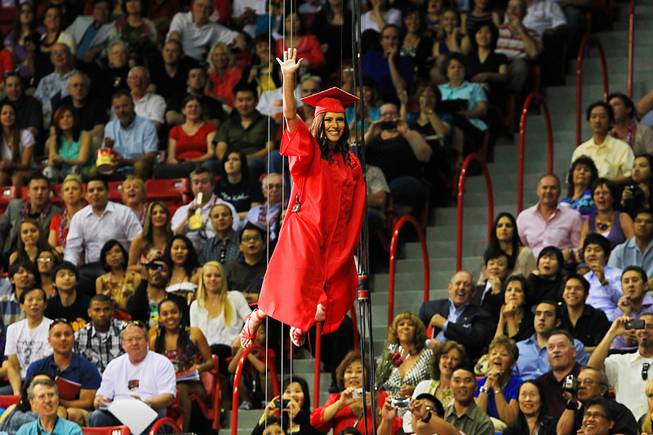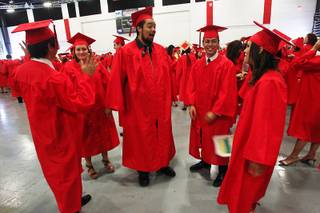
Emily Black flies down to the stage during UNLV’s commencement Saturday, May 12, 2012. Black is part of UNLV’s first class in entertainment engineering.
Sunday, May 13, 2012 | 2 a.m.
UNLV graduation
KSNV coverage of UNLV graduation, May 13, 2012.
Emily Black was flying high when she received her diploma from UNLV on Saturday.
Literally.
As one of the first people to earn a bachelor's degree in Entertainment Engineering and Design, a program that began five years ago at UNLV, Black soared across the stage while suspended from a cable system similar to those that carry aerial acrobats in Cirque du Soleil productions. It's that kind of rigging, along with other artistic and technical elements of modern stage productions, that Black and her fellow degree holders learned to design and operate in the program.
Industry leaders, including Cirque du Soleil producers, approached UNLV asking for the new curriculum, said Joe Aldridge, who became the program director. The program, which officials say is the first of its type, started with four students and now has 102.
"With the advent of most sophisticated technologies, we needed students who understood both the engineering and aesthetics," Aldridge said. "We needed to start training people who understood what a designer or director was looking for but who also understood the mechanics and engineering on a stage like "Ka."
Calum Pearson, vice president of technical and show support for Cirque du Soleil in Las Vegas, said UNLV's program is a needed addition in the high-tech show era.
"In an industry that over the last 30 years has moved from simple wash lights to 3D holograms, getting students involved early in looking forward to the next generation of innovation is a very exciting concept," Pearson said.
Projects have included designing a scale model of Le Reve theater at the Wynn, including all movement apparatus, lights and sound.
The demand isn't new, but the skills needed for emerging technologies are.
"You've got shows such as "O," where you have a stage with 1.5 million gallons of water," Aldridge said. "Well, the Greeks and Romans were flooding places like the Colosseum to recreate sea battles. Now, we're using modern, dry land technology. We used to build shows to fit theaters. Now, we're building theaters to fit shows."
Some graduates of the program already have jobs.
Alan Holton will be an audio technician at "The Beatles: Love," the Cirque show at the Mirage. Miles Caporicci , who will receive his degree summer, has already landed a job with Flying By Foy, a Vegas-based company building rigging such as the one used to send Black across the stage. Black doesn't need a full-time job yet: she's going to graduate school for mechanical engineering.
The skills the students are developing go beyond theater stages or Vegas shows. Students have landed internships helping design and build high-tech convention displays, along with museum and zoo exhibits. They will be qualified to help develop art production in television and film, Aldridge said.
The field was so new, Aldrich said, it caused some confusion in campus offices.
"We kept getting asked, is this in fine arts, or is it the engineering school?" Aldridge said. "We kept saying, 'It's both.'"
On Saturday, the two worlds came together as Flying by Foy sent Black across the stage — a display dreamed up by university president Neal Smatresk as a way to highlight the program.


Join the Discussion:
Check this out for a full explanation of our conversion to the LiveFyre commenting system and instructions on how to sign up for an account.
Full comments policy